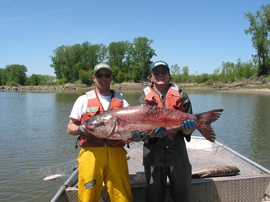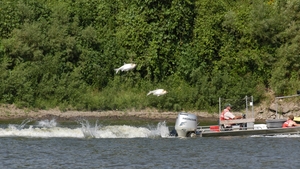Michigan lawmakers buoy efforts to keep Asian carp out of Great Lakes; public invited for feedback in Ypsilanti

Bighead carp are one type of Asian carp that could enter Lake Michigan.
Courtesy U.S. Geological Survey
Michigan lawmakers today called for the swift and permanent separation of Lake Michigan from the Chicago waterway in order to stop Asian carp from populating Lake Michigan.
U.S. Sen. Debbie Stabenow, D-Mich., said the Stop Asian Carp Act would require the U.S. Army Corps of Engineers to provide options for separating the Mississippi River Basin from Lake Michigan within a year and a half, pending its passage by lawmakers.
The Army Corps has begun work on its five-year study already, but that’s not fast enough to stop the carp, and it may or may not include a plan to separate the systems, according to Stabenow.
“Asian carp poses a grave threat to our $7 billion fishing industry, $16 billion recreational boating industry and the entire Great Lakes ecosystem,” said Stabenow, speaking at press conference in Washington, D.C. “The only way to protect our Great Lakes from Asian carp and other invasive species is to permanently separate the Mississippi River and the Great Lakes. We don’t have time to lose.”
Stabenow introduced the legislation today, while a partner bill is being introduced in the U.S. House by David Camp, R-Midland, the chairman of the House Ways and Means Committee.
The U.S. Army Corp has invited local residents to learn about the Great Lakes and Mississippi River Interbasin Study and give feedback at sessions at 2 and 5:30 p.m. March 8 at the Ann Arbor Marriott Ypsilanti at Eagle Crest, 1275 S. Huron St.

Silver carp, another type of Asian carp, often jump from the water when startled.
Courtesy U.S. Geological Survey
A previous bill aimed at temporarily closing locks between the water systems in order to stop the carp failed in 2010, notably lacking support from Illinois lawmakers. But Sen. Dick Durbin, D-Ill., is on board this go-around, Stabenow said. Now, an electric barrier is the only thing stopping the invasive carp from entering the Great Lakes.
And new technology that detects fish DNA in the water shows that the barrier isn’t working, according to fishery biologists.
Under the proposed legislation, a plan for a permanent solution must begin within 30 days of the bill's enactment. The act would require the Army Corps to send a progress report to Congress and the President Barack Obama within six months and again in 12 months.
Stabenow said Obama has indicated he’ll back the effort.
It isn’t clear yet how much the effort would cost, what it would look like or who would pay for it, Stabenow said.
“We are talking about redirecting substantial dollars in to a permanent solution,” Stabenow said.
But what’s clear is the effort would require “All hands on deck,” Stabenow said. The feat of engineering would require cooperation from municipal, state and the federal governments, and each could be asked to chip in.
In the Illinois and Mississippi River systems, two kinds of Asian carp have crowded out native species by eating vast amounts of the same food source, including algae, zooplankton and phytoplankton. For years, the fish have been making their way north toward the Great Lakes, said David Bunnell, an Ann Arbor-based research fishery biologist with the U.S. Geological Survey.
It’s not clear how the carp would behave in Lake Michigan or if they could thrive there, where the waters are cooler, less turbid and offer less to eat than in shallower, warmer river systems.
“When new species come into a new environment, they can do unexpected things,” he said.
If the fish do get into Lake Michigan and are able to move through the Great Lakes and into Michigan river systems, or into bays “they could have tremendous negative impacts there,” Bunnell said.
In some places along the Mississippi and Illinois river systems, the invasive carp make up to 80 percent of the fish population, Bunnell said.
Lynne Whelan, public affairs officer for the U.S. Army Corps of Engineers, said the group can’t comment on the proposed legislation.
Congress created the study with the Water Resources Development Act of 2007, but took two years to fund it, said Dave Wethington, project manager for the study. After it received funding, work got underway and the Army Corps published a project management plan online in November 2010.
The March 8 meeting in Ypsilanti will be the last public meeting held on the GLMRIS; the Army Corps will stop soliciting public comments on March 31. Comments are being solicited electronically through the web site www.glmris.anl.gov. For more information,
contact the GLMRIS project manager, at 312-846-5522 or via e-mail at David.M.Wethington@usace.army.mil.
Juliana Keeping is a health and environment reporter for AnnArbor.com. Reach her at julianakeeping@annarbor.com or 734-623-2528. Follow Juliana Keeping on Twitter


Comments
treetowncartel
Fri, Mar 4, 2011 : 3:18 p.m.
Once they see one of those mammoth prehistoric looking sturgeon they might back track to where they came from.
Awakened
Fri, Mar 4, 2011 : 12:30 p.m.
They are in the US because live fish have been imported for resturants and been introduced into the wild. They have succeeded so well becasue they grow faster and breed faster than native species. My understanding from those who fish in the south is that they are great fishing and good eating. And if the DNA is already in the lake, but we don't know how they will adapt, ie. survive, in the great lake...... How much money should we spend closing this barn door?
Waterdipper
Fri, Mar 4, 2011 : 2:52 p.m.
tdw is correct. Bighead and silver carp were "introduced" into aquaculture ponds and sewage lagoons down south, well before we became aware of aquatic invasive species as a problem of concern . However, by whatever means, they started showing up in several open river systems well before the famous 1990s floods. See following: <a href="http://nas.er.usgs.gov/queries/factsheet.aspx?SpeciesID=549" rel='nofollow'>http://nas.er.usgs.gov/queries/factsheet.aspx?SpeciesID=549</a> <a href="http://nas.er.usgs.gov/queries/factsheet.aspx?SpeciesID=551" rel='nofollow'>http://nas.er.usgs.gov/queries/factsheet.aspx?SpeciesID=551</a> Also, it isn't entirely clear how they would/will do in the open waters of the Great Lakes. The main species of present concern are the bighead and silver carp, both are filter feeders and their preferred habitat is rivers and shallow lakes. The Great Lakes food web has been so depleted by the recently dominant quagga mussels (there are now very few zebra mussels in Lake Michigan, most having been pushed out by the similar-appearing quagga mussels), that these filter-feeding fish may not find enough food to sustain a population - at least in the open lakes. (see <a href="http://www.noaanews.noaa.gov/stories2010/20100927_michiganchanges.html)" rel='nofollow'>http://www.noaanews.noaa.gov/stories2010/20100927_michiganchanges.html)</a> However, the problem remains that the Chicago Sanitary and Ship Canal is still a potential open connection (except for the presence of the electric barriers along the main channel) to the central river systems of the U.S. and species have the potential to move both ways - from the Great Lakes and to the Great Lakes.
tdw
Fri, Mar 4, 2011 : 2:05 p.m.
Actually they weren't " introduced " into the wild.They escaped from farms due to floods
UtrespassM
Fri, Mar 4, 2011 : 3:21 a.m.
If we don't have enough fish men or not enough funding to control the Asia carps, I like to suggest Debbie Stabenow to make a proposer which allow Chinese fish men to come here to help. Please be in mind, People in china don't buy dead fish. so we also need people come from china to prepare the carps or air ship them the same day.
UtrespassM
Fri, Mar 4, 2011 : 3:06 a.m.
Catch them and sell them to Asia countries. People over there can use them to make delicious meals.
David Briegel
Thu, Mar 3, 2011 : 11:01 p.m.
Now that it's too late, our politicians are 'johnny on the spot" to save us from this invasion! Who will save us from the completely ineffective opportunists? Seriously, Who? And yes, it looks like skeet shooting carp will become the newest water sport on the Great Lakes.
tdw
Fri, Mar 4, 2011 : 2:17 p.m.
Actually some politicians tried but Oboma refused to help so he could protect his billionaire shipping buddies in Chicago
John of Saline
Thu, Mar 3, 2011 : 10:41 p.m.
They jump when startled. Hmm. New sport: motor along with shotgun, and shoot at the fish as they jump out of the water. Live skeet!
tim
Fri, Mar 4, 2011 : 3:24 a.m.
I prefer batting practice.
Juliana Keeping
Thu, Mar 3, 2011 : 10:15 p.m.
I have added comments from representatives of the U.S. Army Corps of Engineers.
Edward Vielmetti
Thu, Mar 3, 2011 : 9:22 p.m.
Call it "Silverfin", and perhaps it's good eating - if prepared correctly. <a href="http://www.annarbor.com/vielmetti/asian-carp-aka-silverfin---good-eating-if-prepared-correctly/">http://www.annarbor.com/vielmetti/asian-carp-aka-silverfin---good-eating-if-prepared-correctly/</a>
bugjuice
Thu, Mar 3, 2011 : 8:56 p.m.
The US Constitution makes no mention of carp. Therefore we must resist any effort of the government to make a nanny state regulation regarding carp no matter how much they could affect the environment.
tim
Fri, Mar 4, 2011 : 3:23 a.m.
The Constitution makes no restriction of putting radio active milk on our corn flakes but the FDA wouldn't approve of the sale of that milk.
David Briegel
Fri, Mar 4, 2011 : 12:58 a.m.
Free The Carp!! :>)
dading dont delete me bro
Thu, Mar 3, 2011 : 7:39 p.m.
i certainly don't want to plan an asian carp and feral swine git'down cook out...
Atticus F.
Thu, Mar 3, 2011 : 7:18 p.m.
There are so many special interest groups involved in this carp fiasco, that it's hard to take anybodies words as credible.
E. Manuel Goldstein
Thu, Mar 3, 2011 : 7:13 p.m.
This is yet another problem for which "we" don't have the money to address. It's time for the government to spend less, you know. Besides, if carp DNA is already showing up in the Great Lakes and the lakes are already "infested", perhaps we should all look at this as an opportunity. Sure, we may lose all the bass, walleye, salmon, sturgeon, whitefish, and other valuable species from our waters, but we will then have huge juicy carp to harvest and sell to our financial overlords - the Chinese - who may be willing to pay big yuan for the kind of big specimens they can't grow in China.
Silly Sally
Thu, Mar 3, 2011 : 6:58 p.m.
I spoke to Sen Debbie a few years in the Michigan Union when she addressed a group of women about the environment. I stated that the ash borer is now a fact and instead of providing funding to stop it, to instead use her powers to stop future pests before they become a problem. I mentioned better border inspections for pests, especially any organic imports that might harbor them. But this is not attention getting, so she declined. She rather have a problem to show that she is solving instead of preventing the same problem for a lot less money and heartache. She is a politician, caring mostly about votes, not an environmentalist. What took Sen Debbie so long, the carp problem is not new to Michigan or the Mississippi?